County in a Demo Bind over Center of Government
By Robert Lynch, April 23, 2023
Quite frankly, this was Jason Molino’s baby. But now Molino is gone, and the baby is bawling.
Months before the pandemic, Molino, the former Tompkins County Administrator, caught wind of two prime commercial lots up for sale adjacent to the Courthouse. And even though the County Legislature had months earlier laid down $1.8 Million for a plot of partially-vacant land a block away and tapped it as its intended site for a new multi-story Center of Government, Molino thought this new land looked better, a whole lot better.

For nearly two years, while most of us had COVID-19 on our minds, Molino worked in the shadows. He prodded the County Legislature and its key Downtown Facilities Committee to launch protracted—often tortured—negotiations to purchase both the Key Bank Building on the corner of East Buffalo and North Tioga Streets, and the “Professional Building,” the former Wiggins Law Offices, next to it. All the meetings were secret. I tried to squeeze those in the know to tell me what they knew. They wouldn’t. To whatever was happening behind those locked legislative doors, the public remained blind and deaf to it.
The story finally broke in August 2021, three months after Molino left for another job. It broke only because it had to. Tompkins County was buying the Key Bank Building for $1.7 Million and the Wiggins’ offices for $1.1 Million. The existing buildings would come down. The combined lots would become the new, preferred footprint for a county office building, the Center of Government. Jason Molino’s wish would be fulfilled. The deal closed months later. Earlier this month, Molino’s successor, current County Administrator Lisa Holmes, presented legislators a detailed PowerPoint of where things had been and where they might be headed. She offered little more than the wise among us already knew.
That was then. But now there’s a problem. It came to light when County Administration took its next logical step and drafted a resolution to deconstruct the old Wiggins’ offices as soon as current tenant leases expire next February. The problem is that the City of Ithaca may not let them do it.
“We are essentially saying we are going to deconstruct a building without a plan to construct a Center of Government in its place,” Holmes told the County Legislature’s Facilities and Infrastructure Committee last Thursday. “And that is a little different than where we started, and it runs us afoul of the city’s land use policies.”
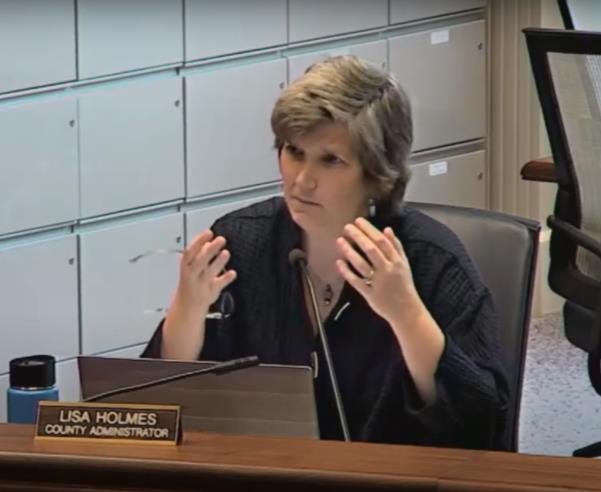
The legislative committee took no action on the deconstruction resolution Thursday. Instead, after 45 minutes’ discussion over whether to move forward with the wrecking ball—possibly pre-empting City law—or instead rewriting environmental paperwork, the committee set a special meeting for April 25th to weigh its options further.
Relatively modern—built sometime in the late 1960’s—and not considered a “contributing structure” of any architectural significance, the stylishly-unique law office building lies within the DeWitt Park Historic District. That locational status gives Ithaca Building Department officials heightened scrutiny over what kind of structure would take its place before an owner could do anything to take the Wiggins building down.
Resolutions passed when Tompkins County bought the twin structures two years ago made clear the County’s intent to replace them with a Center of Government. But structural designs have never advanced beyond conceptual sketches. Nothing’s been said about how big or high the building might be or how ugly it might look. Nor, for that matter, has the Legislature passed a firm commitment to build the building at all. And Thursday’s discussion made plain that on that latter point, opinion remains divided.
“I will admit I am probably the least patient person on this Legislature,” Lansing’s Deborah Dawson conceded. “But this has been going on for three years. We need to fish or cut bait.”
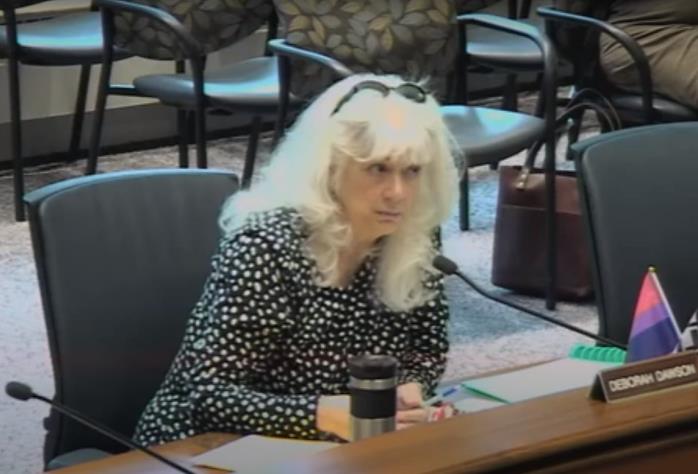
Properties get purchased. Environmental assessments get drafted. Capital plans get written, Dawson noted. And in her opinion, when they were performed, “we made a series of commitments to build a Center of Government.” But yet, Dawson lamented, “every time we try to move this thing forward, someone, somewhere says, ‘Oh, no, no, we didn’t make that commitment; no, we need to take more time and consider it more….’ How many times do we make a decision and a commitment and then we back off and change our minds?”
Committee Chair Mike Lane had a ready reply.
“Deb, I know you’re impatient. You’re also the person who talks very strongly about being careful with our budget. I’m not ready personally to leapfrog into a $20-30 Million project at this point.” (Comments at the April 4th legislative meeting suggested the price tag could climb to $40 Million.)
“We haven’t decided to build that building at all,” Lane insisted. “At least I haven’t voted to spend any money to build it.”
“What more do we really need?” Dryden’s Greg Mezey asked. The Dryden Democrat proved impatient to get the wrecking crews moving. “We’re asking to move forward with the first step in the process,” Mezey reasoned, “Because you can’t have a new building with an old building on the site.”
“Do we need architectural drawings? Do we need to have another resolution? What do we need to have before we show that this is our intention?” Mezey asked.
But City rules are City rules. And County Planning Commissioner Katie Borgella suggested that Ithaca’s reluctance to sign off quickly on demolition stems from a City Hall hesitancy to replace an unwanted building with nothing more than a vacant hole.
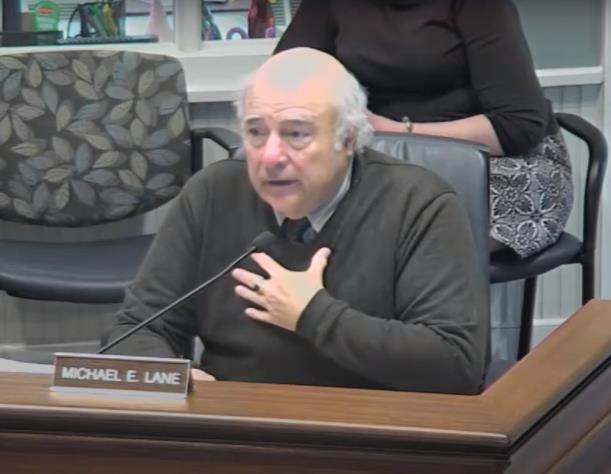
“If it’s clear that there’s a Center of Government going to be built on that corner, then… I think you could probably move forward with demolition of the buildings on the site because of a higher government purpose,” Borgella told the committee. However, she cautioned, “They do have ordinances that you can’t demolish a building in the City of Ithaca without going through site plan review.”
“If you don’t have a clear County purpose of serving something, then you need to conform with (the City of Ithaca’s) land use rule, and that would require going through the whole demolition process that they have in place,” Borgella said.
Those with long memories will recall Ithaca’s misbegotten experience with Urban Renewal in the 1960’s and 70’s and should understand contemporary reasoning. Quick federal cash then led to the hasty razing of vast swaths of downtown, including landmarks like the old Ithaca Hotel and the former Ithaca City Hall. It left only blocks as vacant dust bowls, unreconstructed for years.
“The problem with the law building,” Borgella told the committee, is that you’re “taking something down with no clear plan for what you’re going to do with it.”
“And that’s the whole point of the City’s ordinances that they have in place,” the planner added. “They don’t want people speculating and just clearing off properties in the hopes that someone develops it in the future.”
“Yea, but we’re not just people, we’re the County,” Lane replied.

“What’s the test? Who’s the adjudicator?” Mezey asked in desperation.
Ultimately, that “adjudicator” could, in fact, be a judge. State law provides counties limited authority to overrule municipal land use restrictions, clout that Tompkins County could exercise at the price of poisoning relations with those in Ithaca’s government. Some at Thursday’s meeting suggested that an attorney specializing in land use law be brought into the conversation.
“All I’m looking for on this building is for us to dot our i’s and cross out t’s to whatever entity may put up a barrier to slowing this thing down.” Enfield-Newfield legislator Randy Brown,” told the committee on which he sits.
But in pointing out the false starts and mixed messages the Legislature has given over the years, Brown acknowledged, “The County’s purchased other buildings and it didn’t work out.”
And again, those sudden, seemingly spontaneous swings in Center of Government site-shopping sentiment can confuse those who review the environmental documents that may decide the “Professional Building’s” immediate fate, documents that’ll likely require a rewrite before the demolition resolution tabled by the committee Thursday ever comes up for a vote. Lane reminded members that both the former- and presently-preferred development sites were at separate times listed as a Center of Government’s prospective home. In neither instance, however, has the Legislature ever put up the money to match some politicians’ mouths.
And unlike some on the Facilities Committee, Randy Brown has yet to relegate the old Wiggins offices to the wrecking crane. He called Thursday for a professional evaluation be conducted first into the building’s potential reuse.
“It costs energy to knock a building down. It costs energy to put a new building up,” Brown said. “So I’d like to know if that’s a structurally sound building. That would help me.”
And Randy Brown also proffered the most novel idea of the morning. What about scattering space-hungry County administrative offices around, quartering them in easily-accessible rural schools, instead of concentrating them in a pricey downtown high-rise?
“There are buildings all over the county,” Brown claimed. “Every school has thousands of square feet of empty space where we could… reimagine how we provide services to our constituents and put them in the schools so they’re there working with the people.”

Brown said such a plan would save commutes to Ithaca, thus advancing the “Green New Deal.” And it would bring governmental services closer to the people. “I think this is a visionary thing,” Randy Brown proclaimed. “And building a building downtown doesn’t make sense to me right now,” he added.
Something tells this writer that Jason Molino would view Randy Brown’s idea as simply a vision step too far. Leaders like to build monuments to themselves. A side office in Enfield Elementary or in Newfield Central might win a national award, but it doesn’t cut it for most in the political class. Nonetheless, the prospect of a $30 Million—maybe $40 Million—downtown office building is giving some in Tompkins’ legislative chambers the jitters.
It’s not Jason Molino’s 2019 anymore. Babies do grow up.
###
Water, Land, and a Dirt Road

Breezy Meadows’ Impacts Perplex Planners, Pols, and Public
Analysis by Robert Lynch, April 20, 2023
“There’s no question that there’s a lot of people that have water problems in the Town of Enfield.”
Planning Board Chair Dan Walker to the Town Board, April 12.
“I’m not sure there’s much we can do.”
Enfield Councilperson Jude Lemke (same meeting)
****
Planning Board reports to the Enfield Town Board are usually cut-and-dried affairs; over in a flash. But April’s encounter proved much different. This time, Planning Board Chair Dan Walker took a full ten minutes short of an hour to answer—and to at times, agonize—over Town Board members’ questions concerning the controversial “Breezy Meadows Farm” subdivision. All the time, Breezy Meadows’ project manager Alan Lord sat (presumably) behind a zoom tile that bore his name. He never spoke a word.
“This is the biggest controversy that’s hit Enfield since the Black Oak Wind Farm,” this writer, Councilperson Robert Lynch, observed during his own turn to comment at a Planning Board-sponsored Public Hearing one week before the Town Board’s own April 12th Breezy Meadows discussion. “And I’ll tell ‘ya: We don’t have zoning, and we don’t need zoning to deal with this problem.” I had other plans. But whether those plans will work, we have yet to learn.

Breezy Meadows, New York Land & Lakes Development’s plan to subdivide the former John William Kenney farm between Podunk and Halseyville Roads into 33 building lots of varying sizes, has faced criticism ever since someone stuffed copies of its site plans in neighborhood mail boxes in early-December. Town Planning Board review of the 337-acre subdivision led to the April 5th hearing. After about eight people spoke, and as many as a score looked on to see what transpired, Planning Board members weighed the project’s merits versus its risks. They made no decisions that night. But Board Chair Walker signaled he might move adoption of a required Environmental Assessment at the early-May Board meeting, with subdivision approval to follow.
Nonetheless, one week later, after struggling to answer Town Board concerns about the subdivision’s impact, Walker backed off a bit.
“Right now, I don’t see a final approval coming at the May meeting,” Walker told the Town Board April 12th, “because we don’t have all the data in yet.”
Yet Walker made no promises. “The Planning Board is an independent Board. And we do follow the regulations of the State and our Town’s Site Plan and Subdivision regulations,” the Chairman reminded anyone who would listen. “We are an independent Board, as we do our due diligence. I think we are very careful about doing that.”
Exacting timetables aside, odds right now point in Breezy Meadows’ favor. While public opinion tumbles decidedly against the project, and while some Town Board members voice concerns, the key decision-makers in Enfield’s most contentious housing controversy either lean in the project’s favor, or simply accept its inevitability.
“I’m not sure there’s much we can do,” Councilperson Jude Lemke warned after Councilperson Lynch cautioned that a 33-lot rural subdivision could easily double or triple in density if lot purchasers ignore Land & Lakes’ intended deed restrictions and simply subdivide their parcels further.
“The subdivision meets all of the Town’s regulations under the Subdivision Regulations,” Walker advised the Town Board. “So we really have no basis for denying the subdivision.”
“Unfortunately, if they start to (further) subdivide all these properties, then we’re going to have to deal with the issue then, because today there’s nothing in our law that would prevent them from doing this project,” Lemke advised.
Transforming open fields into hobby farms, mini-estates, or equestrian pastures may jar the senses of those who remember what the old Kenney farm used to be. Short of a total ban on development, the town can do little to hold back some degree of progress. But to Breezy Meadows’ critics, concerns lie far deeper—in some respects, literally deeper. Foremost among the concerns of many is the impact 33 (or more) new homes would have on a water supply that just about everyone agrees remains marginal at best.
“We’ve always had problems with the amount of water for the household. To overlook that would be a problem,” Iradell Road resident Russ Carpenter told the planners’ Public Hearing. “I really think… if you’re going to have this much housing development, you really have to consider the Town’s putting in a water district of some sort,” Carpenter said, suggesting that public sewers may need to follow.
“We’re not going to have public water in my lifetime; probably (in) most of your lifetimes. We have to rely on wells,” Lynch answered. “Our neighbors cannot run out of water.”
At both the Planning Board’s hearing, and a week later before the Town Board, Lynch pushed for Land & Lakes Development to do the same thing that the ill-fated Black Oak Wind Farm’s developers had to do a decade ago, namely perform a full-blown Environmental Impact Statement (EIS), not just the much more abbreviated “Environmental Assessment” Land & Lakes has already undertaken, aided by Walker’s assistance. Lynch would have Breezy Meadow’s developers focus on water issues; both the project’s impact on neighboring wells and also on water quality. “A full hydrological study,” I told the hearing, is what’s needed.
How much might such a study cost, Lemke asked Walker at the Town Board’s meeting. Walker guesstimated between $20,000 and $50,000 based on the developer’s need to drill a series of test wells at perhaps 4-5 thousand dollars per drill.
This Councilperson shot back, “It’s costing $20-50 thousand. The developer’s paying $1.6 Million for the land. It’s a drop in the bucket!”
But Dan Walker has repeatedly expressed doubt that water will be an issue, the chairman relying on the assumption that the Breezy Meadows’ lots, that would range in size from two to 32 acres, would be spread out sufficiently so that one owner’s well would not drain dry another, or far more importantly, anyone else’s well lying outside the development. Indeed, speaking before the Town Board, the Planning Board’s Chair suggested that a more tightly-packed four-lot subdivision already built at Van Dorn and Enfield Center Roads impacts its own water table much more.

“At this point, I have no documentation that this is going to be a major issue,” Walker told the Town Board concerning water supplies and pushing back on the need for an EIS. “Based on my experience with shale aquifers, (it’s that) they are low producing aquifers, but they generally stay pretty consistent unless you have huge demand on them.”
“The size of the lots provides enough area to protect other wells,” Walker reasoned. And if the dangers of well depletion were greater, Walker told the Town Board, “We’d have to do an EIS and a hydrological study for every two-lot subdivision” that the Codes Inspector, Alan Teeter, approved.
Walker readily admitted during Town Board questioning that Breezy Meadows’ siting puts it in a place where, as Russ Carpenter testified, well water conditions leave much to be desired.
“There’s no question that water supply in the Town is variable,” Walker said. “But with the low density of this development, the average of 10-15-acre lots, there’s enough separation that it shouldn’t be impacting adjoining neighbors.”
A state-prepared well survey—one that only lists newer wells drilled since about 2000, and relied on by the Board Chair to support his assessment—lists most wells near the proposed development in the 150-200 foot depth range, often producing water at an average two gallons per minute.
“They’re not the best producing wells,” Walker acknowledged. What’s more, he admitted, “a two gallon/minute yield can be run out if you aren’t careful with your water uses.”
A new home is going up just off the Breezy Meadows site, on Aiken Road near Halseyville. A well’s being drilled there. And Walker told the Town Board he’ll look closely at that new well’s performance once drilling is complete.
****
Paul Tunison knows the condition of Tucker Road. He and his wife live there. “The condition of Tucker Road is pretty bad,” Tunison told the April 5th hearing. Without a doubt, Tucker Road’s condition—now and in the future—bears heavily on Breezy Meadows’ impact. Gravel-based Tucker effectively bisects the development site, and Land & Lakes would front as many as 24 of its 33 building lots on it.

“It’s essentially a one-and-a-half lane road. It’s passable. But it can’t handle the kind of traffic for the 23-24 residences that are proposed for this subdivision,” Tunison told the hearing. Who’s going to pay for its upgrade, he asked. Tunison thinks the developer should pay.
Hayts Road sheep farmer Marguerite Wells agrees. And she brought figures—however accurate they may be — to the Planning Board’s hearing. By Wells’ calculations, at current estimates of $200,000 per mile, the paving of Tucker Road would eat up a full 19 per cent of the Enfield Highway Department’s budget in a single year. And it would take 10-15 years for the increased assessments of the newly-fronted residences on Tucker to pay back the cost.
Dan Walker and Enfield Highway Superintendent Barry “Buddy” Rollins take a different view. They sense no urgency for Tucker Road’s paving. Walker had talked with Rollins prior to the Planning Board’s review, and Rollins, himself, addressed the road’s condition at the Town Board’s meeting.
“(Rollins) feels Tucker Road is in pretty good condition for an unimproved gravel road,” Walker informed the Planning Board. The Superintendent “did not feel there was a need to totally rebuild the road,” Walker reported. “We have other gravel roads in the town that are in worse shape.”
Rollins told the Town Board a week later that he’s worked on Tucker Road. He reported that the ditches are good, and there are “very few potholes or wet spots.” Rollins continued, “My goal is to make all roads oil and stone roads.” And that, he said, includes Tucker. With oil and stone, the Superintendent stated, “That will handle car traffic and most delivery traffic, but not tractor-trailers and 10-wheelers every day.”
Of course, those bigger trucks could infect Tucker Road during Breezy Meadows’ construction.
“Our approval will state that this is a gravel road, and the Town has no plans to upgrade that to a paved road,” Walker told the Town Board, regarding Tucker. “The expectation should not be that that’s going to be a paved road.”
Councilperson Lynch, this writer, pushed back:
“The question is: ‘The road is never going to be improved; it’s going to remain a gravel road’ is all right until you get 24 people with houses along Tucker Road, and they come to this Town Board and say please pave that road. That’s going to happen if it gets a lot of use regardless of what the land seller tells the homeowner. They’re going to say ‘we want a better road.’”
The final spindle bracing this awkward, three-legged stool of opposition involves farmland. Land & Lakes estimates that the Kenney farm has 145 acres of agricultural land and that subdividing it would only take 29 acres away. Critics (including this writer) maintain farmable acreage would shrink to near zero. Soil quality remains subject to debate. Sheep farmer Wells chooses to think positive.
“There’s a very strong demand locally for farmland,” Wells told the Public Hearing. “There are so many farmers who would love to rent that farm.”
“We are all beneficiaries of this beautiful rural quality of life,” Wells continued. “But they could do a much more careful job of subdividing these parcels to protect the farm parcels and allow farming to continue.”
Wells presented the Planning Board a Crayola sketch of her redesign that would cluster houses on one portion of the Kenney farm and leave the rest to agriculture. Walker later critiqued Wells’ alternative.
To “densify” the property, “could actually create more water supply problems,” Walker told the Town Board.
But Wells remains undeterred. “Leave the farmland as farmland, and leave the dirt road (Tucker) as not a burden to the taxpayers of Enfield,” she pleaded.
Not all agree that Breezy Meadows’ soils are so prime or that its acreage will attract a line of bidders.
“It is not now being farmed because the farmer that was farming a lot of that land said he had problems getting a crop up every year because of the wetness conditions, and that the lease cost of the farmland was not worth it to him,” Walker informed the Town Board, the planner relying on what the developers had told him.
The Board Chair also posited that nothing would preclude a farmer from purchasing several of Breezy Meadows adjoining lots and merging them into a farmable field. Still, without a doubt, Land & Lakes’ would charge that farmer inflated prices more applicable to people than cows.
****
Where the Breezy Meadows’ debate leaves all of Enfield right now is with guarded uncertainty; and also with an unsettling expectation that this 33-lot subdivision will happen one way or another. Even were Enfield to be zoned, a large-lot slicing and dicing of an overpriced abandoned farm is hard to stop.

At the April 12th meeting’s start, this Councilperson advised he might introduce a Town Board motion regarding Breezy Meadows. “Does the Board believe we should provide the Planning Board some guidance on this, or should we just keep our powder dry right now?” Lynch asked later after the Town’s Board and top planner had gone back-and-forth. (A Resolution lay at the ready.)
“I’d like to hold off and see what data Dan puts forward at the next meeting,” Supervisor Stephanie Redmond responded. Thus, for the moment, the Town Board’s powder remains dry.
Breezy Meadows is an Enfield controversy not soon to fade away. And it won’t fade away after the Planning Board’s next meeting… or the meeting after that. But the May third session could prove pivotal. We’ll all see what happens then.
###
TC Leg: “Let the Producers Pay”
by Robert Lynch, April 18, 2023; additional reporting April 19, 2023
For the fourth time in as many meetings, the Tompkins County Legislature took the occasion Tuesday to tell Albany lawmakers what to do. Only this time, it was different. The vote was unanimous, rather that splitting predictably down partisan lines.
Without a single dissent, local legislators urged the State Senate and Assembly to enact, and Governor Hochul to sign, a measure that would force the manufacturers of packaging—particularly plastic—to bear up to half the cost borne by the municipalities that recycle them.

Tuesday’s vote came at an otherwise relatively routine legislative session whose otherwise most noteworthy take-away was the appointment of an Ontario County administrator, Lorrie Scarrott, as Tompkins County’s new Director of Finance.
“Our recycling costs have skyrocketed,” Barbara Eckstrom, Tompkins County’s recently-retired Director of Recycling and Materials Management, told the County Legislature. “It is not fair for the burden of the cost of recycling that’s mandated in this state to be borne by government and not those that produce the packaging.”
The County Legislature Tuesday coupled its endorsement of New York’s proposed “Packaging Reduction and Recycling Infrastructure Act” with similar support for an enhanced New York “Bottle Bill,” a revision that would double the cost of a soda or beer bottle’s deposit from a nickel to a dime and expand the deposit mandate’s reach to cover a wider range of containers, including liquor bottles.
“Five cents means nothing,” Eckstrom told the Legislature. “Ten cents is very common in states around the country.”
In recent meetings, the County Legislature has placed its endorsement behind pending, liberal-leaning bills in Albany this legislative term that would accelerate proposed increases in New York’s minimum wage, speed green-building mandates to prohibit as soon as next year fossil-fuel heating in new home construction, and ban the sale of menthol cigarettes. Republicans often dissented on those measures. But this time, on container legislation, they backed the local body’s Democratic majority. The difference was cast in dollars. Tougher container mandates could save taxpayer money.
“I think it is very important we push back on manufacturers to be stewards for the products they’re shipping to us,” Newfield-Enfield’s Randy Brown told Tuesday’s meeting. “Plastic is used because it’s light and it’s a lot less weight, low volume, spread out, very easy to collect and manage,” Brown added.
Brown said manufacturers, as opposed to municipal recyclers, hold the technological advantage in reducing landfill waste. “They have the systems… the ability to make packaging recyclable, and we need to push back on them,” Brown stated.
A second Republican, Groton’s Lee Shurtleff, asked Eckstrom how much the proposed packaging law might save this county’s government. The retired recycling chief didn’t have a ready answer, but made an educated guess.
“I think we are talking in the millions in terms of savings,” Eckstrom surmised. “Maybe one to 1.5 Million.”
“The recycling market has plummeted,” Eckstrom reported. She predicted the slumping market for once-valuable castoffs could make for her former department a “$300,000 to $500,000 shortfall this year.
“We luckily have an annual fee,” Eckstrom acknowledged, referring for the uniform fee homeowners pay annually—this year $80—tacked onto their tax bill. But if the market for recyclables continues to tank, and deficits mount, she warned, “It’s going to go up; you know, up, up, up; if things go on further with all of this”
“You know my hesitancy on advising the Legislature and the Governor on legislation,” Shurtleff said. “But this clearly has an impact upon the local taxpayers.”
“The time is overripe here,” Eckstrom observed, admitting the packaging mandate’s been proposed before, only to meet stiff headwinds from a New York Governor, one who’s no longer in office.
“Cuomo was not—it wasn’t something that was ever going to happen,” Eckstrom told Tuesday’s meeting, hoping that with Hochul now in the Governor’s Mansion, prospects for the packaging bill’s adoption look brighter.
“I can imagine this week’s Ithaca Times is going to be, ‘Barb Eckstrom versus the Governor on the other side,’ the Chair laughingly said, referring to the weekly’s previous report on Tompkins County’s ongoing battle with the Executive Branch regarding Medicaid reimbursements.
“I wouldn’t be able to say that unless I’d retired,” Eckstrom replied with a chuckle.
And as for the need to double the bottle deposit, Dryden’s Mike Lane drew his own comparison, remembering that long ago, when he was a kid, quart soda bottles carried a nickel deposit, same as today. “And with a nickel,” Lane remembered, “you could buy a standard Milky Way or Snickers bar.”
****
“I’d like to thank each and every one of you for placing your faith and trust in me in this role,” Lorrie Scarrott said following the County Legislature’s unanimous appointment of her as County Government’s new Director of Finance. Scarrott, who public records indicate currently serves as the Deputy Director of Finance for Ontario County in Canandaigua, fills the post left vacant since late last November with the retirement of former Finance Director Rick Snyder. Scarrott will begin work locally May first.
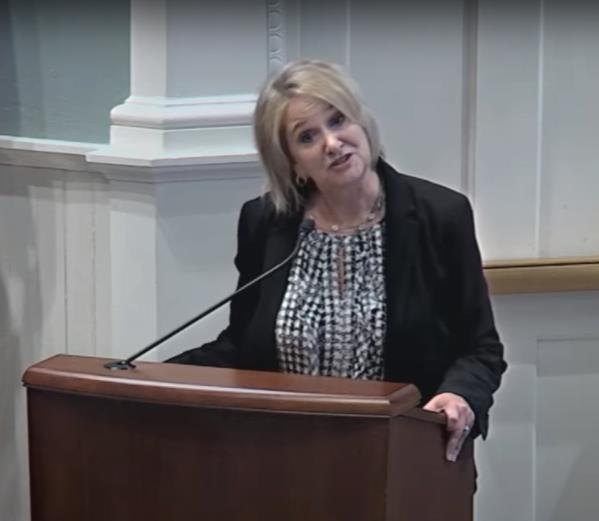
“I’ve been watching Tompkins County as an organization from afar for quite a few years,” Scarrott said at the podium following her appointment. “I have always wanted to come here and work, so this is kind of like a dream come true for me… I’m very excited.”
The new appointee told lawmakers she brings to her new job over 22 years of governmental finance experience, skills gained, she noted, in a county with a population similar to Tompkins’.
“And as we all know, some things are the same; some things are different,” Scarrott told lawmakers, acknowledging governmental comparisons and contrasts. “And so I’m sure I have a lot to share with each of you, and I’m sure each of you have a lot to share with me.”
Tompkins County evaded one big obstacle in filling Snyder’s shoes, one that’s frustrated its leaders during several recent executive searches—namely the high cost of local housing. Tompkins legislators, in appointing Scarrott, waived the local residency requirement, thereby making it eligible for the appointee to commute from her current residence, presumably located somewhere between her old job and her new one.
Since December, Enfield’s Andrew Braman has been Snyder’s interim replacement. Presumably he’ll stay on as Scarrott’s deputy. During Tuesday’s meeting, legislators applauded Braman for his oversight of governmental finances during the past five months.
On a different matter, Tompkins lawmakers Tuesday avoided—but only for two weeks—making a tough call which may either delight or anger local arts organizations. It postponed until May 2nd voting to reallocate more than $1.4 Million in hotel room tax revenue to a variety of programs aimed at shoring up the local arts community, many of whose organizations have suffered from dwindling attendance and sagging revenues post-pandemic.
Ithaca’s Amanda Champion requested delay, which passed the Legislature just barely on an 8-6 vote. Champion referenced unspecified “amendments” she expected some would offer had the debate continued. It alluded to a backstory yet to be told.
Funding supporter Greg Mezey wanted an immediate vote, saying he needs no delay. And he revealed that the legal question yet unresolved involves whether room tax surpluses can be clawed back by County Government and put into the general fund.
“I don’t really need a legal opinion,” Lansing’s Mike Sigler said. “I don’t want to go back two years and reach back and grab that money back.” What’s more, Sigler said, money in the General Fund “just kind of gets muddled.”
At the meeting’s start, representatives of several local arts organizations took their turns supporting the room tax’s repurposing. Remarked Joey Steinhagen, Artistic Director of the youth-centered Running to Places Theater Company, “We’re struggling to keep our heads above water.”
###
April News Briefs:
Deadheads in Politics:
Apr. 30): Maybe Dan Klein remembers local history differently than I do. Or maybe it’s what spills from decades of questionably-deserved, superabundant hype.

On May 8, 1977, I was News Director of Ithaca’s WTKO. Klein, now Vice-Chair of the Tompkins County Legislature, reminds us that on that day the Grateful Dead played Cornell’s Barton Hall. I vaguely remember they held a concert here. I didn’t attend (even though we radio people sometimes got free tickets.) Surely, Ithaca didn’t stop dead (sorry) on that date. It was just a concert, nothing more. I doubt I even sent a reporter.
But a mystique has since enveloped that concert. And this Tuesday, May 2, Klein will begin the County Legislature’s twice-monthly meeting by proclaiming this year’s May 8th as “Grateful Dead Day.” The celebrated date will coincide with another Barton Hall concert, this time featuring three of the Dead’s ex-band members. (It calls itself “Dead & Company” now; sense a trademark issue?)
The Grateful Dead’s 1977 concert “has become the most famous of their 2,300 concerts,” Klein’s proclamation reads, and it continues, “It was true then, and it is true now, that there is nothing like a Grateful Dead Show.”
Back in ’77, I think Republican Jim Ray represented Enfield on what’s now our County Legislature. No, I cannot imagine Ray’s ever issuing this proclamation. Times have surely changed. / RL
###
COVID Mall Sampling Site to Close:
(Apr. 28): With use declining and County Government subsidies having ended last December, Cayuga Health Systems will close its COVID-19 sampling site at the Shops at Ithaca Mall May 5th, Cayuga Health and Tompkins County Health authorities announced Friday morning.
The planned closing , coupled with the loss of County subsidy, puts an end to free COVID testing for Tompkins County residents, an innovative service that began in September 2020, a time when local residents needed to drive to state centers in Binghamton or Syracuse to be tested or pay the local hospital’s $99 charge. At the time, this Councilperson, Robert Lynch, became among the strongest advocates for the County-subsidized free testing.
A County Health Department release Friday stated that the hospital system’s decision to close the sampling site followed “a multi-month review of notable decline of its use.” The statement continued, “Cayuga Health will offer testing to the public at physician offices, including walk-in visits at Immediate Care (a hospital run outpatient clinic) and at other healthcare providers in the community.”
But cost now becomes the issue. And the statement acknowledges that unless the testing qualifies as “medically necessary,” including in preparation for surgery, those tested may need to pay for the procedure. When a Federal Emergency Declaration expires May 11, even those with insurance may be assessed copay.
###
Money Encouragement for ECC:
(Apr. 27): The Enfield Community Council (ECC) Board of Directors Thursday received good news just when members needed it most.
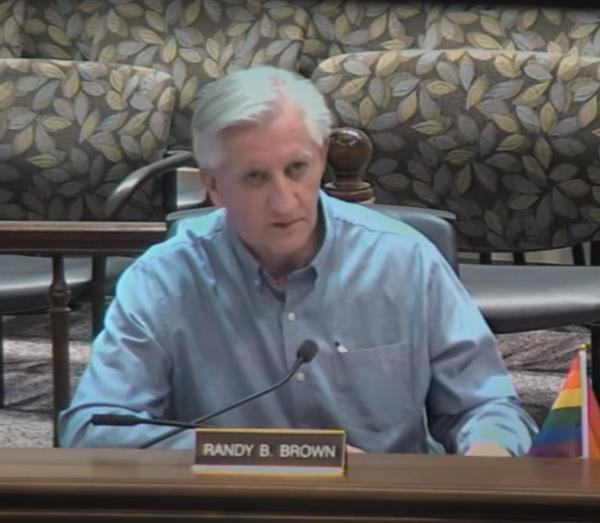
Hopes dimmed earlier this week for the agency’s receiving Tompkins County Community Recovery funds to construct a mental health wing that would cost at least $146,000 (see separately-posted story). But County legislator Randy Brown Thursday brought the ECC Board two nuggets of encouragement, each of which may soften the blow.
First, Brown said he thinks he’s found the support he needs to win County Legislature endorsement for a special state law that would waive approximately $8,000 in back property taxes that the ECC should never have been assessed, but had to pay anyway for failing to file its paperwork on time. A county legislative committee April 6th had refused to advance the measure, a majority reluctant to support it.
But that may change. “I think we have eight votes,” the magic number needed for passage, Brown surprisingly told the ECC. He’d likely circumvent the committee and press the resolution himself.
Secondly, Brown told ECC he wants to allot the agency $25,000 in next year’s county budget as a so-called “Over-Target Request,” a spending add-on legislators often make. Brown asked the ECC Board to come up with a spending item they’d like included. “By the next meeting, we’ll have something for you, ECC President Cortney Bailey responded.
###
Cops Without a Leader:
(Apr. 26): Maybe this is how a liberal city defunds the police: You just let all the cops quit.
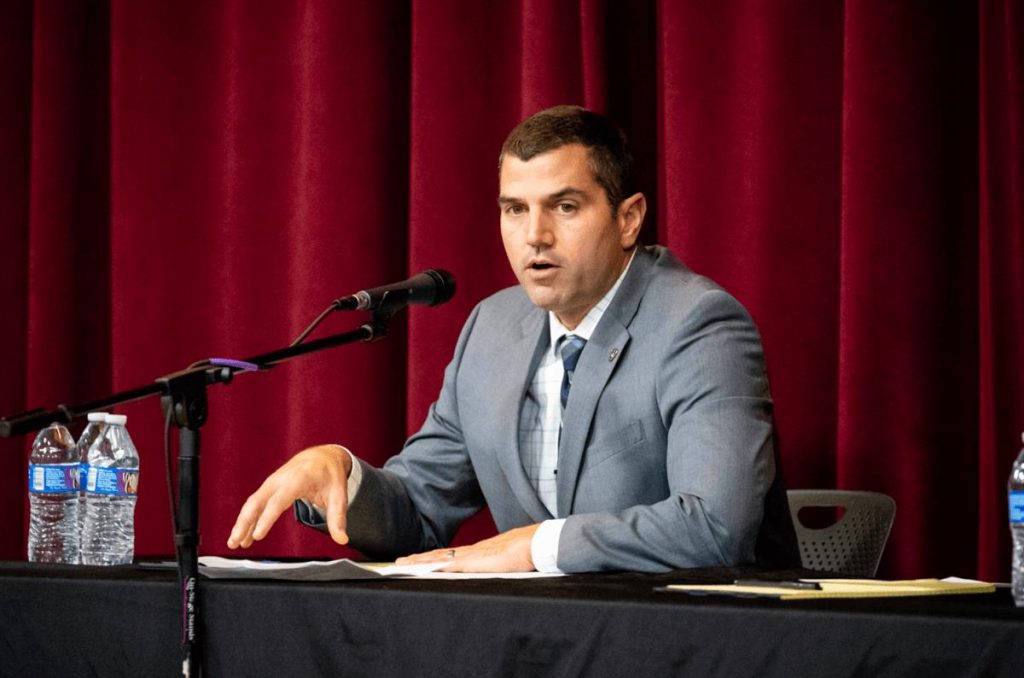
In what came this week as another example the toxic standoff between City Hall and law enforcement, Acting Ithaca Chief of Police John Joly, according to news reports, has taken “an indefinite personal leave from his position,” putting the IPD close to leaderless. Joly cleaned out his office last week.
The Ithaca Voice reports Joly told them, “I will be taking extended leave to focus on maintaining my own personal wellness.”
Joly, you’ll recall, was the preferred candidate for permanent Chief that Mayor Laura Lewis recommended to Common Council. But a majority of Council members objected, and Lewis pulled the nomination.
Who’s now in charge of IPD remains a question. There’s a Deputy Chief, but he’s near retirement. And neither he nor Mayor Lewis will comment on the situation.
But wait, there’s more: Joly, we’re told, plans to take the City to court, alleging it subjected him to a “hostile work environment.”
Ours is a central city not to be proud of right now. / RL
###
Shawna: A Smaller, Cheaper Jail
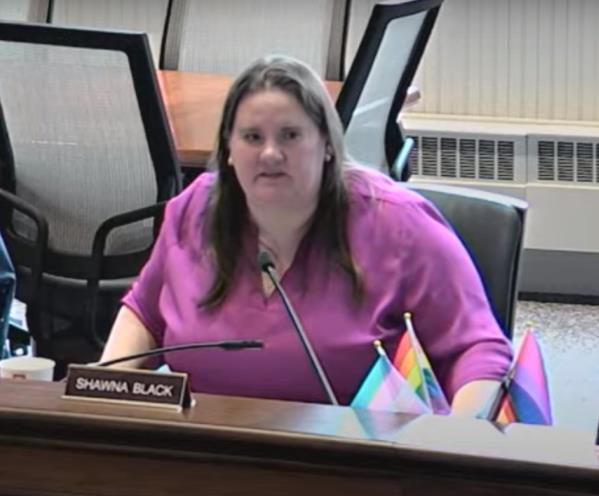
(Apr. 26): Buried in Tuesday’s discussions concerning a mammoth new office building—yet perhaps the most telling remark of the meeting—Shawna Black, Chair of the Tompkins County Legislature signaled that a recently-assembled Task Force, comprised of both legislators and community members, may recommend against any major upgrade of the Tompkins County Jail, a project now priced at $20-40 Million.
“I don’t think it’s the time to invest in a jail because of bail reform,” Black said. “Our (jail population) numbers are up and down… just all over the place.”
One option before the Legislature’s Public Safety Committee would demolish the 1980’s-era Public Safety Building’s cellblock wing and construct a “pod” system instead. Black said pods now look less attractive since the State won’t permit the efficient layout to mean fewer guards.
The Task Force grew out of a February meeting where legislators delayed moving quickly with jail renovation planning. In March, Black appointed the task force’s seven members. A statement then said, “The task force will make recommendations related to the design of a jail facility that accommodates community priorities.”
Now Black, the Legislature’s most powerful voice, is telling us more about those “priorities.” “I think if we really want to talk about bail reform and social justice, the group’s going to come in and say, ‘you know what, we don’t want to have a jail of 78 or 76 (beds), whatever the variance is.’… I think that’s where the conversation will probably head.”
“Are you saying that this listening group that we’ve had is going to decide how many jail cells we have?” legislator Mike Lane asked incredulously. Black said they may recommend just that.
###
Enfield Budgets Federal Cash:
(Apr. 20): The Enfield Town Board took its first comprehensive steps Thursday in spending nearly $350,000 awarded it by Washington more than a year ago under the American Rescue Plan (ARPA). And it focused first on Town-owned facilities long in need of improvement.

Board members reaffirmed their consensus, authorized through a vote April 12th, to spend up to $50,000 of the ARPA funds to replace the original metal roof, now badly leaking, covering the Old Highway Barn. The “Town Hall,” as it’s called, includes the Clerk’s Office.
Then, through a series of rapid-fire votes, the Board granted unanimous consent to spend $23,000 on painting and siding improvements outside the Enfield Courthouse, to authorize the Highway Superintendent to look for a Highway Department back-up generator, and to purchase three AED defibrillators, two for the Highway Department, and one for the Town Hall.
But the Board’s 90-minute work session looked farther on how to spend the cash.
Councilperson Robert Lynch, who said he wants ARPA spending to be “transformative” and also “purposed for people,” proposed $60,000 appropriations each to Enfield Food Distribution, the Enfield Community Council, and the Enfield Volunteer Fire Company. No decisions were made, but the idea gained some traction when others cut the figure to $50,000.
Further decisions on ARPA spending will come later. / RL
###
A Chief Judge at Warp Speed:
(Apr. 23): Maybe it can be said, as I’ve written, that Democrats have gotten the “Liberal Lion” that they demand to lead New York’s Highest Court.

It was only April 10th that Governor Hochul nominated Rowan Wilson, currently an Associate Justice on New York’s Court of Appeals, to lead that same Court as Chief Judge.
In stark contrast to the persistent foot-dragging on Hochul’s first nominee, Hector LaSalle, ultimately rejected, the State Senate held confirmation hearings just seven days after the nomination, recommended confirmation, and the full Senate followed suit and confirmed the next day, Tuesday.
“Even when you don’t agree with his holdings, Judge Wilson will change the way you think about a legal issue,” Brad Hoylman-Sigal, Chair of the Senate Judiciary Committee, said of the confirmed nominee, (Remember, how tough Hoylman-Sigal was on LaSalle?)
Senate Republicans are among those who don’t like Wilson’s holdings very much, particularly his freeing of a convicted North Country rapist. Said Senate Minority Leader Robert Ortt, “They (Democrats) made it very clear they wanted an activist Court. They got it in Rowan Wilson.”
###
T.C. Finance Chief Tapped:
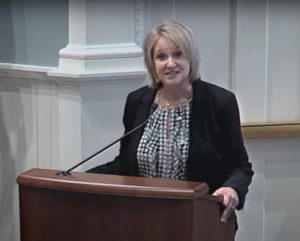
(Apr. 19): A five-month search for Tompkins County’s new Director of Finance ended Tuesday with the County Legislature’s unanimous appointment of Lorrie Scarrott to that position. Though not mentioned at the meeting, public records indicate Ms. Scarrott currently serves as Deputy Director of Finance for Ontario County. She’ll begin work locally May first, replacing Rick Snyder, who retired in November.
“I’ve been watching Tompkins County as an organization from afar for quite a few years,” Scarrott said at the podium following her appointment. “I have always wanted to come here and work, so this is kind of like a dream come true for me… I’m very excited.”
The appointee acknowledged county governments do some things quite the same, others things differently. With that in mind, she said, “I have a lot to share with each of you.”
Enfield resident Andrew Braman has served since December as Director Snyder’s interim replacement. County legislators later in Tuesday’s meeting thanked Braman, a deputy director, with a round of applause.
The Elephant in the (court) room?
(Apr. 15): Liberal activists felt free to pluck Judge Hector LaSalle’s minor decisions from obscurity to torpedo his nomination to be Chief Judge of our state’s Highest Court. Why can’t conservatives do the same with Rowan Wilson, Gov. Hochul’s latest nominee to preside over the Court of Appeals?

They did. A Rochester TV station (WHEC) confirmed Thursday a social media posting by a right-wing advocacy group, the “Empire Center,” that Wilson, associate justice on the Court of Appeals, supported giving an elephant at the Bronx Zoo the legal right to sue his “jailer” and be sent to an animal sanctuary.
Animal rights activists maintained that “Happy” the elephant, a 50-year zoo resident, wasn’t really happy and sought habeas corpus the same way Death Row inmates do. The Court ruled 5-2 that habeas is only for humans. Rowan Wilson disagreed.
Yes, Wilson admitted, “Happy” is not a person. Yet, he wrote, “Happy has very substantial cognitive, emotional and social needs and abilities.” Further, he said, the Court has a duty to “recognize Happy’s right to petition for her liberty not just because she is a wild animal who is not meant to be caged and displayed, but because the rights we confer on others define who we are as a society.”
Of course, don’t expect opinions like that to derail Rowan Wilson’s elevation to Chief Judge. Political double-standards are fun to watch, aren’t they? / RL
###
April Ballot set; No challenges:
(Apr. 14): They drew numbered golf balls at the Board of Elections Friday morning. And though it’s said ballot order really doesn’t matter, incumbent James Ricks will be listed first on the candidate line in the June 27th Democratic Primary for Enfield Councilperson. Chris Willis will come first on the Republican ballot for Highway Superintendent.
Candidate Robert Lynch (this writer), was the only Enfield candidate to appear in-person for Friday’s drawing. Board of Elections staff drew for others. Incumbent Lynch’s draw placed him second on the three-person Democratic ballot for two Town Board seats. The ballot will list newcomer Melissa Millspaugh last.
On the Republican ballot, challenger Willis will be followed by incumbent Highway Superintendent Barry “Buddy” Rollins.
Each of the candidates for Enfield Councilperson submitted Designating Petitions carrying more names than the 49 needed to qualify for the Primary. Lynch led the way with 149 names, followed by Ricks at 110, and Millspaugh at 86. Elections staff report a few people had inquired about contesting one or more Enfield petitions, yet none filed challenges. The deadline for filing challenges has passed.
###
Another Hinchey in Congress?
(Apr. 13): Most media attention this week focused on Democrat Josh Riley’s early announcement of his repeat effort to become Tompkins County’s Congressman, Riley losing last November to Republican Marc Molinaro. Announcing his candidacy more than 18 months ahead of the election, Riley’s early-bird attempt is often used by a once-defeated candidate to scare away intra-party competition. (Remember Tracy Mitrano?)

But here, it may not work. The Daily Freeman reported Tuesday that State Senator Michelle Hinchey, daughter of the late Maurice Hinchey, our former Congressman, is also eyeing the 19th District’s Democratic nomination.
“The outpouring of support and encouragement to run for the 19th Congressional District has been incredible,” Senator Hinchey said in an email to the Kingston-based newspaper Tuesday. “As a young woman watching what’s happening in our country today, I am currently considering the best way that I can keep helping people and improving our region,” the Cornell-educated late Congressman’s daughter continued.
Competition is good. Coronations often don’t work so well. Tracy Mitrano should remember that. Watch this race.
###
The “Liberal Lion” Dems Want:
(Apr. 13): Expect far less grumbling from the Left and probably an uneventful confirmation process when Governor Hochul’s elevation of New York Court of Appeals Associate Justice Rowan Wilson to Chief Judge reaches the State Senate.

Unlike Hochul’s first nominee, mid-level Appellate Justice Hector LaSalle, rejected by the Senate, Wilson, African-American, nominated by Hochul Monday, is seen as a reliable liberal on the State’s Highest Court. Appointed an Associate Justice by former Governor Cuomo in 2017, Wilson, a California native and Harvard Law School Graduate, wrote the dissenting opinion when the Court rejected the State Legislature’s gerrymandered redistricting maps last year.
Senate Deputy Majority Leader Michael Gianaris, a key power-broker in the Legislature’s upper house, has given Wilson his blessing, as he has Hochul’s simultaneous nomination of former New York State Solicitor General Caitlin Halligan to fill the Associate Justice’s slot that Wilson’s elevation would open up.
“I am particularly excited about the prospect of Judge Wilson leading our state’s highest court as Chief Judge,” Senator Gianaris was quoted by the media. “I look forward to hearing from these nominees and voting for their confirmations in the coming days.”
Republicans, however, have grumbled about Hochul’s double-dipping from the same committee-recommended list to pick both Judges Wilson and Halligan. The Legislature just recently passed a law enabling such dual nominations, but a GOP leader warns that law could violate the State Constitution.
###
Rollins faces GOP Primary:
(Apr. 11): As political rumor had suggested, long-time Enfield Highway Superintendent Barry “Buddy” Rollins will, for the first time in years, face a challenger in his race for the Republican nomination to keep his job.
Chris Willis, of 198 Black Oak Road, filed designating petitions for Highway Superintendent with the Tompkins County Board of Elections Monday afternoon, the final day such petitions could be accepted. If their petitions are deemed valid, Rollins and Willis would face off in a June 27th Republican Primary. Regardless of its outcome, Rollins will be assured a ballot line in November, as Democrats recently cross-endorsed him.
Final day filings Monday revealed no additional Enfield surprises. Incumbent Democrat Stephanie Redmond remains the only party-designated candidate for Town Supervisor. Republican Heather Knutsen-King is the lone candidate for Town Justice. A three-way Democratic Primary for two Town Councilperson seats looms in the offing.
***
Food Pantry’s Owens Lauded:
(Apr. 11): A commendation well-deserved, Jean Owens, director of Enfield Food Distribution, was Tuesday named April Community Hero of the Month by the Tompkins County Chamber of Commerce, a monthly award given by the Chamber in partnership with Tompkins Community Bank.

“Jean and her family have lived in this area for generations, and she is truly committed to improving the quality of life for people in our community, especially those who live in rural areas,” the Chamber credited the person who nominated her as stating. “Every person who enters the food pantry is greeted by Jean and she will make sure you have what you need to feed your family. She will even go as far as to give someone $5 of her own money if they can’t afford the gas to make it to work.”
The Tompkins Chamber states that its award “recognizes individuals from Tompkins County who have significantly impacted our community.”
The Chamber’s announcement quoted Owens as saying she did not see the Community Hero of the Month Award coming, and hadn’t thought about it, but “it is a great honor and a great opportunity to share what we’re all about at Enfield Food Distribution.”
Jean Owens, director of Enfield Food Distribution since it began in the 1980’s… and as it grows today, a hero. Thanks. / RL
###
Center of Government Price Climbs… Again:
(Apr. 7): For the careful observer (like this writer), it was an hour-long presentation that spoke many words, but made little news.
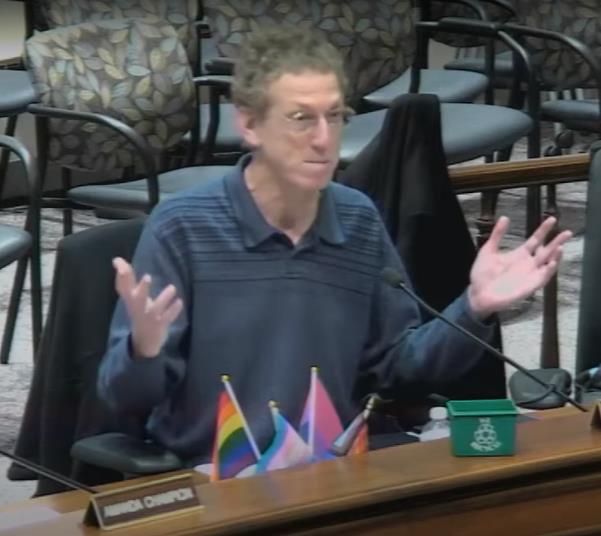
Still, one of the few nuggets gleaned from Administrator Lisa Holmes’ update to the Tompkins County Legislature this week on a future downtown Center of Government was that what has been viewed as a $30 Million project could cost taxpayers far more.
Tompkins County priced a downtown office building at $22 Million in 2020. A 2022 revision hiked the cost to $30.6 Million. But Holmes conceded Tuesday that her latter figure was based on estimates made in 2020 or ’21.
“I think it’s a little preliminary for me to give too much (cost data) on the Center of Government until we really get into the preliminary schematic designs and give the Legislature better estimates on construction costs,” Facilities Director Arel LeMaro said in response to legislator Randy Brown’s pointed inquiry.
Before the discussion ended, a new threshold figure found itself bandied about.
“We’re going to spend $40 Million to do this thing and move a lot in there but it’s going to be full from Day One,” Danby’s Dan Klein lamented.
A second nugget gleaned from the talk was that some, including Lansing’s Mike Sigler, want to look into repurposing, not razing, the Key Bank and Wiggins’ Law Office buildings the County has purchased for millions as the Center’s preferred site.
“I don’t know if there’s an appetite for that,” Sigler said of possible reuse. “But frankly, I don’t know if there’s an appetite for building a $40 Million building, either,” Sigler added. /RL
###
Second CEDO Search Dead-Ends:
(Apr. 6): For a second time, Tompkins County’s search for a new Chief Equity and Diversity Officer (CEDO) has come up dry.
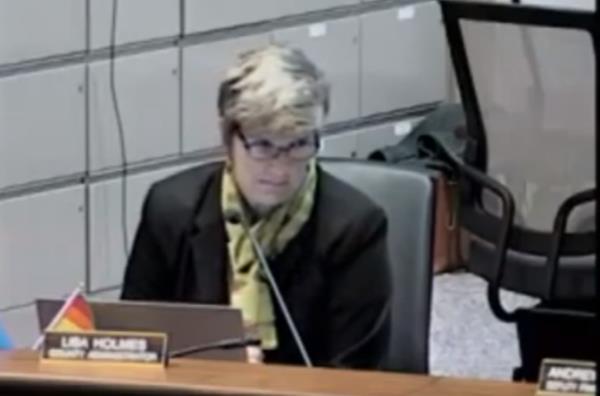
County Administrator Lisa Holmes disclosed the failed second-round recruitment effort in a zoom conference with local municipal leaders Thursday morning. An offer was made, but the candidate declined because of “family decisions,” Holmes said.
The Diversity Officer, a relatively rare position for counties upstate, monitors governmental policies to guard against systemic bias. The local post has lain vacant since Tompkins County’s first CEDO, Deanna Carrithers, resigned last summer. Her first-round replacement, Anitra Rivera, accepted the job in October, but then, likewise, withdrew.
The high cost of local housing often stands as a prime factor in out-of-town recruits declining acceptance. Holmes did not elaborate on this latest candidate’s reasons.
“We are disappointed with this whereas it is a second failed search,” Holmes said.
###
Enfield Dem. Primary Likely:
(Apr. 6): This year, just like four years ago, a Democratic Primary for seats on the Enfield Town Board appears a near certainty, following petition filings with the Tompkins County Board of Elections Thursday.

Three candidates, including both incumbents whose terms expire this year, filed Democratic Designating Petitions for Town Councilperson, as did one other candidate.
Robert Lynch (this writer), a second incumbent, James Ricks, and newcomer Melissa Millspaugh of Hubbell Drive, each will seek the two Board seats available. If elections officials determine all petitions valid, a June 27 Primary would select the two nominees.
On Tuesday, incumbent Stephanie Redmond filed petitions to seek a new 2-year term as Enfield Supervisor. As yet, no Republican or Democrat has come forth to challenge her. Barry “Buddy” Rollins has filed for Highway Superintendent and Mary Cornell for Town Clerk; each, so far, unopposed.
Of note, Republican Heather Knutsen, appointed in January as Clerk of the Enfield Town Court, has filed petitions to become Town Justice, filling the seat of Judge Betty Poole, who ended her decades-long tenure in December. No Democrat has yet filed for Justice.
Party hopefuls have through Monday (4/10) to file petitions. Any Independent candidate would file later. / RL
###
County weighs in on Breezy Meadows:

(Apr. 4): Just days before what’s likely to be a testy Public Hearing, Tompkins County’s Planning Department has raised concerns about Enfield’s proposed 33-lot Breezy Meadows Farm subdivision and has recommended certain changes, in part, to better protect water quality.
“We have determined the proposed action will have a significant county-wide or inter-community impact,” County Planning and Sustainability Commissioner Katherine Borgella wrote in a 2-page letter to Enfield’s Codes Officer March 30. Borgella’s letter was shared in materials for review at a Wednesday (Apr. 5) Planning Board Public Hearing on the project.
Among County Planning’s concern is the need to better identify building lots close to streams, and then protect those streams with 50- or 100-foot buffer areas. “The modification is recommended to help preserve and protect water quality,” Borgella wrote.
The planner also recommended that a written agreement be struck with Tompkins County to ensure retention of a County-run communications tower on the site. The letter further cautioned that the unpaved Tucker Road, which bisects the proposed subdivision, may not be up to handling the traffic 24 new building lots bordering it would generate.
Enfield’s Planning Board could override Borgella’s objections, but only by a supermajority vote.
###

